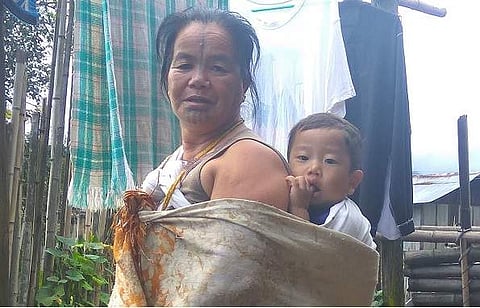

ZIRO: While the rest of India is slowly getting acquainted with tattoos, the Apatanis of Ziro valley in Arunachal Pradesh are no stranger to this art form.
Apatanis, until 1974, used to have tattoos on their face, with piercings such as nose plugs and so on. While women used to tattoo a long line from forehead to the nose tip and five smaller lines on the chin, men used to get a ‘T’ inked on the chin.
"We believed that women with face tattoos, nose plugs and elongated earlobes got good husbands,” said Narang Yamyang, the last Apatani woman to get a face tattoo. Other theories suggest that Apatanis got their women’s face inked to make them less beautiful and prevent other tribes from kidnapping them.
Elaborating the technique of tattooing, Yamyang says: "The tattooing was done with a thorny plant locally called 'tipe tere'. The thorny plant is dipped into a paste of soot and pig fat and then the tattoo inked on the face by slowly hitting the thorn in the face with a cane. It was a very painful process. It was believed that fair women should ink darker women and vice versa for a better imprint."
However, the tribe banned face tattoos in 1974 because they were being easily identified and were being discriminated against.
“Voices started raising against face tattoos and nose and ear mutilation as education began to spread in Ziro Valley. The first step against this tradition was taken by Dr Dani Duri in 1974. Slowly, most of the youth started supporting him," said Yamyang’s husband and local historian Narang Tam.
The young Apatanis, many of whom work and study in metropolises of ‘mainland India’, do not consider banning facial art as a loss of heritage. They say that they will never get their faces inked. They also believe that their movement against the facial tattoo has inspired other tribes of the state, the most glaring example being Nyishi tribe and Aka tribe who gave up their ankle tattoo and facial tattoo respectively.
Kago Taming, a 23-year-old who works in a private firm in Bengaluru, said, “We already face a lot of discrimination for our mongoloid features in the metropolises. Imagine the eyeballs we would attract if we enter a shopping mall in trendy modern clothes along with face tattoos.”
However, modernity has come at a cost. Many of the Apatani children are forgetting their own language and they prefer to speak in Hindi and English. "Many children are sent to boarding schools right from the age of 5 or 6. They learn Hindi and English which are necessary to interact with other tribes of the state. They come home only during vacations and get to interact very less with parents. The result being many forgetting their language and speaking only Hindi and English. A person doesn't lose identity if they shun their facial tattoo. If a person loses his or her language, his identity is lost," said Apatani elder Hibu Taka.